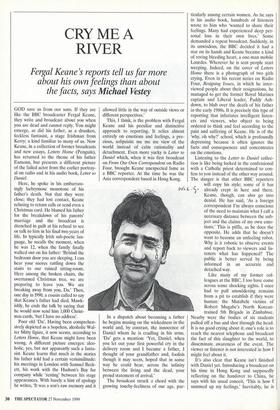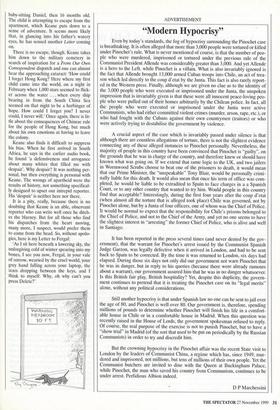CRY ME A RIVER
Fergal Keane 's reports tell us far more about his own feelings than about the facts, says Michael Vestey
GOD save us from our sons. If they are like the BBC broadcaster Fergal Keane, they write and broadcast about you when you are dead and cannot reply. You might emerge, as did his father, as a drunken, feckless fantasist, a stage Irishman from Kerry; a kind familiar to many of us. Now Keane, in a collection of former broadcasts and new essays, Letters Home (Penguin), has returned to the theme of his father Eamonn, but presents a different picture of the failed actor from the earlier portray- al on radio and in his audio book, Letter to Daniel.
Here, he spoke in his embarrass- ingly lachrymose monotone of his father's death. Not that they were close; they had lost contact, Keane refusing to return calls or send even a Christmas card. He blamed his father for the breakdown of his parents' marriage and the broadcast is drenched in guilt at his refusal to see or talk to him in his final two years of life. In typically Irish sub-poetic lan- guage, he recalls the moment, when he was 12, when the family finally walked out on his father: 'Behind the bedroom door you are sleeping. I can hear your snores rattling down the stairs to our ruined sitting-room. Here among the broken chairs, the overturned Christmas tree, we are preparing to leave you. We are breaking away from you, Da.' Then, one day in 1990, a cousin called to say that Keane's father had died. Mawk- ishly, he ends the talk by saying that he would now send him 1,000 Christ- mas cards, 'but I have no address'.
Poor old 'Da'. Having been comprehen- sively depicted as a hopeless, alcoholic Wal- ter Mitty figure, it now seems, according to Letters Home, that Keane might have been wrong. A different picture emerges: alco- holic, yes, but not apparently such a fanta- sist. Keane learns that much in the stories his father told had a certain verisimilitude: his meetings in London with Samuel Beck- ett, his work with the Hudson's Bay fur company while 'resting' between his stage appearances. With barely a hint of apology he writes, 'It was a son's raw memory and it allowed little in the way of outside views or different perspectives.'
This, I think, is the problem with Fergal Keane and his peculiar and distinctive approach to reporting. It relies almost entirely on emotions and feelings, a pre- cious, solipsistic me me me view of the world instead of calm rationality and detachment. Even more yucky is Letter to Daniel which, when it was first broadcast on From Our Own Correspondent on Radio Four, brought Keane unexpected fame as a BBC reporter. At the time he was the Asia correspondent based in Hong Kong.
In a dispatch about becoming a father he begins musing on the wickedness in the world and, by contrast, the innocence of Daniel whom he is cradling in his arms. 'Da' gets a mention: 'Yet, Daniel, when you let out your first powerful cry in the delivery room and I became a father, I thought of your grandfather and, foolish though it may seem, hoped that in some way he could hear, across the infinity between the living and the dead, your proud statement of arrival.'
The broadcast struck a chord with the growing touchy-feeliness of our age, par-
ficularly among certain women. As he. says in his audio book, hundreds of listeners wrote to him who 'wanted to share their feelings. Many had experienced deep per- sonal loss in their own lives.' Some demanded a repeat broadcast. Suddenly, in its unwisdom, the BBC decided it had a star on its hands and Keane became a kind of roving bleeding heart, a one-man mobile Lourdes. Wherever he is sent people start weeping. Indeed, on the cover of Letters Home there is a photograph of two girls crying. Even in his recent series on Radio Four, Resigning Issues, in which he inter- viewed people about their resignations, he managed to get the former Royal Marines captain and Liberal leader, Paddy Ash- down, to blub over the death of his father in the early 1980s. It is precisely this type of reporting that infuriates intelligent listen- ers and viewers, who object to being ordered to think and feel according to the pain and suffering of Keane. He is of the 'why, oh why?' school, which is profoundly depressing because it often ignores the facts and consequences and concentrates on the emotions.
Listening to the Letter to Daniel collec- tion is like being locked in the confessional with a Catholic priest determined to con- fess to you instead of the other way around. The danger is that other BBC reporters will copy his style; some of it has already crept in here and there. Keane, though, can also go into denial. He has said, 'As a foreign correspondent I'm always conscious of the need to maintain what I call a necessary distance between the sub- ject and the claims of my own emo- tions.' This is piffle, as he does the opposite. He adds that he doesn't want to become an unfeeling robot. Why is it robotic to observe events and report back to viewers and lis- teners what has happened? The public is better served by being informed in an accurate and detached way.
Like many of my former col- leagues at the BBC, I too have come across some shocking sights. I once had to pull smouldering remains from a pit to establish if they were human: the Matabele victims of Robert Mugabe's North Korean- trained 5th Brigade in Zimbabwe. Nearby were the bodies of six students pulled off a bus and shot through the head. It is no good crying about it; one's role is to reach the nearest telephone and broadcast the fact of this slaughter to the world, to disseminate awareness of the event. The viewer or listener is not interested in how I might feel about it.
It's also clear that Keane isn't finished with Daniel yet. Introducing a broadcast on his time in Hong Kong and supposedly reflecting on the handover to China, he says with his usual conceit, 'This is how I summed up my feelings.' Inevitably, he is
baby-sitting Daniel, then 16 months old. The child is attempting to escape from the apartment, which Keane puts down to a sense of adventure. It seems more likely that, in glancing into his father's watery eyes, he has sensed another Letter coming on.
There is no escape, though. Keane takes him down to the military cemetery in search of inspiration for a From Our Own Correspondent dispatch and one can almost hear the approaching cataract: 'How could I forget Hong Kong? Here where my first child came into the world, on a night in February when 1,000 stars seemed to flick- er across the water ... when every ship bearing in from the South China Sea seemed on that night to be a harbinger of hope. How could I forget you? I never could, I never will.' Once again, there is lit- tle about the consequences of Chinese rule for the people of Hong Kong, but much about his own emotions at having to leave the colony.
Keane also finds it difficult to suppress his bias. When he first arrived in South Africa, he says in the earlier audio book, he found 'a defensiveness and arrogance about many whites that filled me with despair'. Why despair? It was nothing per- sonal, but then everything is personal with Keane. The wrongs of apartheid were the results of history, not something specifical- ly designed to upset our intrepid reporter. His 'despair' is neither here nor there.
It is a pity, really, because there is no doubting that Keane is an able, observant reporter who can write well once he ditch- es the blarney. But for all those who find his dispatches from the heart moving, many more, I suspect, would prefer them to come from the head. So, without apolo- gies, here is my Letter to Fergal: 'As I sit here beneath a lowering sky, the unforgiving cold of winter spearing into my bones, I see you now, Fergal, in your vale of sorrow, wearied by the cruel world, your grey hand falling across your laptop, the tears dropping between the keys, and I think to myself: Why, oh why can't you press Delete?'



























































































 Previous page
Previous page